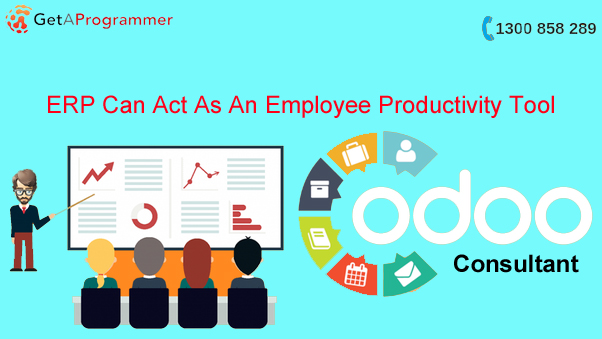How ERP Can Act As An Employee Productivity Tool
by Rob Stephen getaprogrammerThis article will help organisations know how ERP as a comprehensive functional system can help to raise the potency of employees of your organisation.
ERP software solutions have been so far aiding big and small enterprises to automate, streamline, and accelerate their business operations. While ERP has been a great tool for organisations to handle all tasks from one, it also helped them to view real-time the status of various tasks and reach for well-informed decisions. However, in the course, the solution helped directly the employees to be more productive and doing their role more efficiently. Being a comprehensive and integrated system, it connects every department and representatives with their specified job roles. With better interactions, they can deliver their role faster and enhance the company’s performance. Inevitably, the implementation of ERP renders the teamwork and coordination and subsequently result in maximum job satisfaction.
Here’s how ERP can contribute towards improving your workforce’s productivity and help them have a satisfactory work-life.
Employees can perform with a definite job role
ERP system helps in averting all the drawbacks faced by unorganised processes in a company like work duplication. Many are not even aware of that. Such situations of overdoing a work or repetitive work are common when the companies don’t act with a plan or their departments are not connected to a central system. ERP acts as the centralised system and bears a dashboard, where works of each staff are specified and recorded. So, they know their role and what the are work they are supposed to deliver.
Improvement in the workflow
Implementing ERP system can magnify the efficiency of workflows and simultaneously lead to a rise in production and revenues. With it, different processes are in sync, designated to particular teams, and resultantly there’s no chance of work getting excessive for one team. This way, duplicate tasks or overtime work are completely eliminated and make the workflows of an organisation faster and efficient.
Assimilating information to accredit workers
Managers can extract information about workers, their task schedule, performance, leaves and overtime working hours, and so forth from the centralised database of the ERP. Besides, they can know the progress of a project, its status for completion, run compliance check, or get its auditing done. Using the information, they can discover the role or contribution of each employee and how they excelled in their area. Accrediting them or rewarding them will certainly boost their morale and motivate them to perform better.
Help employees provide customer services more efficiently
The ERP system helps the front-desk staff of the organisation in delivering customers services more efficiently. They simply cannot enjoy the interactions with the customers when they don’t have enough customer information. To help them serve properly, there should be accurate and end-to-end information of the customers from their contacts to earlier purchases story.
So, ERP just does not help to simplify the operation of an enterprise but also directly impacts the employee positively by assuring them greater job satisfaction. While most businesses consider ERP as a tool for automation and managing all tasks at one place, these facts assert that it is rightly becoming a tool for nurturing employees’ performance and make them perform better and more efficiently.
Rob Stephen is an Odoo functional consultant at GetAProgrammer, a distinguishing software solutions company in Australia offering benevolent applications of ERP and CRM using the leading platform, Odoo. experienced in the field for more than 5 years, he has rich insights of industries and devises befitting ERP solution for enterprises catering to their unique needs.
Sponsor Ads
Created on Dec 8th 2018 01:17. Viewed 375 times.





